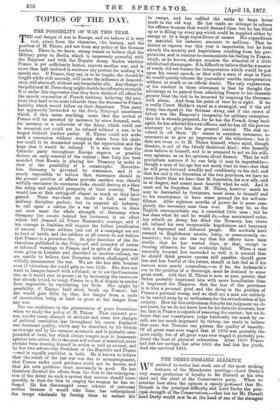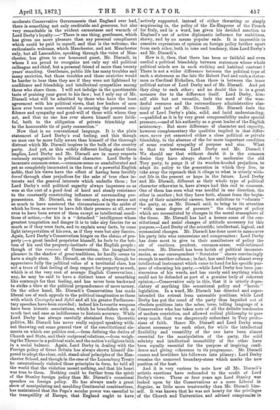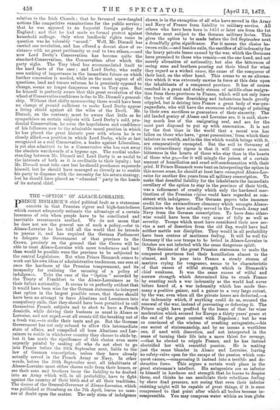THE DERBY-DISRAELI ALLIANCE.
WE omitted to notice last week one of the most striking features of the Manchester meeting,—Lord Derby's very warm profession of loyalty to Mr. Disraeli as his own chief and the chief of the Conservative party. When we consider how often the opinion is openly professed that Mr. Disraeli is the principal difficulty and Lord Derby the prin- cipal strength of the Conservatives,—that but for Mr. Disraeli Lord Derby would now be at the head of one of the strongest moderate Conservative Governments that England ever had, there is something not only creditable and generous, but also very remarkable in the evident earnestness and warmth of Lord Derby's loyalty:—" There is one thing, gentlemen, which has given me more pleasure than any personal compliment which could be paid to myself, and that is the welcome, the enthusiastic welcome, which Manchester, and not Manchester only, but all Lancashire, speaking through the voice of Man- chester, has given to our honoured guest, Mr. Disraeli, in whom I am proud to recognize not only my old political colleague and chief, but a personal friend of more than twenty years' standing. Gentlemen, public life has many troubles and many anxieties, but those troubles and those anxieties would be harder to bear than they are if they were not lightened by confidence and friendship and intellectual sympathies among those who share them. I will not indulge in the questionable taste of praising your guest to his face ; but I only say of Mr. Disraeli what will be admitted by those who have the least agreement with his political views, that few leaders of men have ever been more successful in securing the personal con- fidence and sympathy and good-will of those with whom they act, and that no one has ever shown himself more faith- ful, both to the obligation of private friendship and to the honourable tie of party connection."
Now that is no conventional language. It is the plain statement of Lord Derby's real feeling, and this though no man can be more fully aware than himself of the thorough distrust which Mr. Disraeli inspires in the bulk of the country party. And yet, as this widely different feeling about them implies, Lord Derby and Mr. Disraeli are in many respects curiously antagonistic in political character. Lord Derby is incarnate common-sense,—common-sense so unadulterated and yet so completely incarnated in the form of a powerful English noble, that his views have the effect of having been forcibly bored through class prejudices for the sake of true class in- terests and the general interests which underlie them ; for Lord Derby's cold political sagacity always impresses us as won at the cost of a good deal of hard and steady resistance to the constantly constricting influence of surrounding pre- possessions. Mr. Disraeli, on the contrary, always seems not so much to have mastered the circumstances in the midst of which he lives, as never to have felt their pressure at all, never even to have been aware of them except as intellectual condi- tions of action,—for his is a " detached " intelligence whose greatest temptation and danger it is to take airy fancies for as much as if they were facts, and to explain away facts, by some light interpretation of his own, as if they were but airy fancies. Again, Lord Derby's Conservatism hinges on the claims of pro- perty ;—a great landed proprietor himself, he feels to the bot- tom of his soul the property-instincts of the English people ; though of the romance of Conservatism, the imaginative pleasure in the shadow of great traditions, he hardly seems to have a single atom. Mr. Disraeli, on the contrary, though he appreciates fully the political value of a territorial class, has not a trace of that feeling of deep respect for property as such, which is at the very root of average English Conservatism ; nay, he may be–said to have a distinct trace of something like contempt for that feeling, and has never been backward to strike a blow at the political preponderance of mere money. On the other hand, Mr. Disraeli's Conservatism has made liberal use of such appeals to the political imagination as those with which Coningsby and Sybil and all his greater Parliamen-
tary speeches have been crowded ; indeed his favourite weapons have been historic associations, which he brandishes with as much tact and ease as indifference to historic accuracy. While Lord Derby has always carefully abstained from theoretic politics, Mr. Disraeli has never really enjoyed speaking with- out throwing out some general view of the constitutional ele- ments on which our politics rest, —from defining the duties of Church and State, and their reciprocal relations,—from weigh-
ing the Throne in a political scale, and the nation's religious faith
in a social balance. Again, Lord Derby in dealing with the Foreign policy of Great Britain has always shown himself dis- posed to adopt the clear, cold, stand-aloof principles of the Man- chester School, and though in the case of the Luxemburg Treaty he ostentatiously violated those principles in form, he told all the world that the violation meant nothing, and that his heart was true to them. Nothing could be further from the spirit of the Stanley foreign policy than Mr. Disraeli's occasional speeches on foreign policy. He has always made a great show of manipulating and moulding Continental combinations, has maintained that the Pope's secular power was essential to the tranquillity of Europe, that England ought to have actively supported, instead of either thwarting or simply acquiescing in, the policy of the Ex-Emperor of the French for Italy, and in a word, has given his decided sanction to England's use of active diplomatic influence for ambitious, showy, and by no means popular ends. It is impossible to conceive expressions of opinion on foreign policy further apart from each other, both in tone and tendency, than Lord Derby's and Mr. Disraeli's.
How is it, then, that there has been so faithful and even cordial a political friendship between statesmen whose whole political minds are in such striking and habitual contrast ?
There is not a wider difference between the political type of such a statesman as the late Sir Robert Peel and such a states-
man as Cardinal Richelieu, than there is between the inner political nature of Lord Derby and of Mr. Disraeli. And yet they cling to each other ; and no doubt this is in a great measure due to the difference itself. Lord Derby, him- self able but not versatile, feels the need of the won- derful resource and the extraordinary administrative elas- ticity and tact of Mr. Disraeli. Mr. Disraeli feels the need of Lord Derby's plain, solid, and lucid understanding, —qualified as it is by very great compressibility under special pressure,—and of his authority as a great leader of the English aristocracy. But mere difference of character and capacity, however complementary the qualities implied in that differ- ence, never yet cemented either a close political or private friendship, in the absence of the far more important condition of some central sympathy of purpose and aim. What is that tie between Lord Derby and Mr. Disraeli ? We should say that without doubt it is the common desire they have always shared to modernise the old Tory party, to purge it of its wooden-headed prejudices, to adapt its policy to the generation in which they live, to take away the reproach that it clings to what is utterly with- out life in the present or hope in the future. Lord Derby and Mr. Disraeli, different as their whole type of political character otherwise is, have always had this end in common. One of them has seen what was needful in one direction, the other in another ; but they have both, almost from the begin- ning of their ministerial careers, been solicitous to " educate " the party, or, as Mr. Disraeli said, to bring to its attention "with some degree of pressure" the changes of policy which are necessitated by changes in the moral atmosphere of the times. Mr. Disraeli has had a keener sense of the con- stitutional and social changes of attitude necessary for this purpose,—Lord Derby of the scientific, intellectual, logical, and economical changes. Mr. Disraeli has done most to manceuvre his party into wise concessions and compromises ; Lord Derby has done most to give to their manifestoes of policy the air of cautious, prudent, common-sense, well-informed resolves. Mr. Disraeli has been lavish of political inconsist- encies, as our correspondent " Scrutator " shows convincingly enough in another column ; in fact, has used freely almost every intellectual instrument which came to hand for his specific pur- pose of educating his party,—while Lord Derby has been par- simonious of his words, and has rarely said anything which could not be defended as part of a genuine body of coherent opinion,—Conservative only in this, that it is utterly depre- ciatory of anything like sensational policy and "heroic" legislation. In a word, Mr. Disraeli has directed and super- intended the retreat from untenable positions, while Lord Derby has put the creed of the party thus beguiled out of obsolete positions into the sober, terse, telling language of a Conservative who has taken note of all the definite tendencies of modern conviction, and allowed radical philosophy to pare away much that was dangerously redundant in Tory profes- sions of faith. Hence Mr. Disraeli and Lord Derby seem almost necessary to each other, for while the intellectual flexibility and versatility of the one have been almost essential for the manipulation of the party, the solid sobriety and intellectual immobility of the other have been equally essential for the purpose of inspiring confi-
dence and giving coherence to its programme. Mr. Disraeli coaxes and bewilders his followers into pliancy ; Lord Derby remains the unmoved boundary-stone which marks the new position of the host. And it is very curious to note how all Mr. Disraeli's artistic exertions have redounded to the credit of Lord Derby's views. Three or four years ago Lord Stanley was looked upon by the Conservatives as a mere Liberal in disguise, as little more trustworthy than Mr. Disraeli him- self. It was known that he was not hearty for the privileges of the Church and Universities, and advised compromise in relation to the Irish Church ; that he favoured new-fangled notions like competitive examinations for the public service ; that he was opposed to an Imperial foreign policy for England ; and that he had made no formal protest against household suffrage. Only when landlords' rights came in question was he tolerably "sound." Well, Mr. Disraeli has carried one revolution, and has offered a decent show of re- sistance with no great pertinacity or zeal to two others,—and now Lord Derby's Conservatism has become quite the standard-Conservatism, the Conservatism after which the party sighs. The Tory ideal has accommodated itself to the hard facts of the case ; and Lord Derby, who really sees nothing of importance in the immediate future on which further concession is needed, while on the most urgent of all questions, land and tenure reforms, he is genuinely opposed to change, seems no longer dangerous even to Tory eyes. But he himself is perfectly aware that this great revolution of the wheel of Conservative confidence is due to Mr. Disraeli's general- ship. Without that shifty manceuvring there would have been no change of ground sufficient to make Lord Derby appear a living shield against all the wiles of the Devil. Mr. Disraeli, on the contrary, must be aware that little as he sympathises on certain subjects with Lord Derby's cold, pru- dential Conservatism, he owes the hopefulness and confidence of his followers now to the admirable moral position in which he has placed the great historic peer with whom he is so closely allied,—a position in which Lord Derby, while at last recognized as a real Conservative, a leader against Liberalism, is yet also admitted to be a Conservative who has cast away the obsolete watchwords of a bygone age. The cordial under- standing between Mr. Disraeli and Lord Derby is as useful to the interests of both as it is creditable to their loyalty ; but Mr. Disraeli must take care lest he should perchance supersede himself, lest he should have managed so cleverly as to enable his party to dispense with the necessity for his astute strategy, lest he should have placed an " educated " party in the hands of its natural chief.




































 Previous page
Previous page